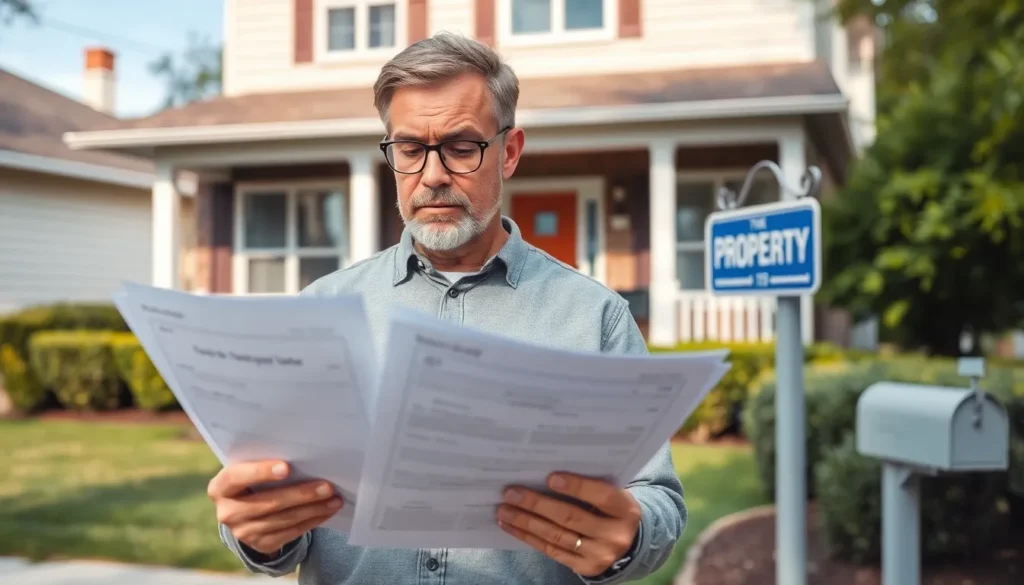Table of Contents
ToggleRenting a house can feel like a rollercoaster ride—thrilling, a bit scary, and full of unexpected twists. On one hand, it offers flexibility and freedom that homeownership can’t match. Who wouldn’t want to skip the endless maintenance and lawn care? But before you dive headfirst into the rental pool, it’s essential to weigh the pros and cons.
Understanding Renting a House
Renting a house presents both opportunities and challenges. Delving into the specifics enhances understanding and aids in making informed decisions.
Definition of Renting
Renting involves leasing a property from a landlord for a set period. Tenants pay monthly rent, gaining the rights to occupy and use the property without owning it. This arrangement often includes terms outlined in a lease agreement, detailing responsibilities and conditions for both parties. Renting provides a unique housing option, catering to various needs and preferences.
Common Reasons to Rent
Many individuals choose to rent for various compelling reasons. Flexibility stands out, allowing tenants to relocate easily as personal or professional situations change. Affordability plays a crucial role; renting often requires lower upfront costs compared to purchasing a home. Access to amenities is another significant factor, as many rental properties come with features like pools or gyms. Additionally, renting minimizes maintenance responsibilities, freeing tenants from costly repairs and upkeep.
Pros of Renting a House

Renting a house offers various advantages that cater to different lifestyles and preferences. These benefits play a significant role in its appeal to many.
Flexibility and Mobility
Renting provides unparalleled flexibility for individuals and families. Tenants can easily relocate for job opportunities or personal reasons, avoiding the commitment of homeownership. Changes in life circumstances often prompt a need for new living arrangements, and renting accommodates those transitions. Shorter lease terms, ranging from six months to a year, enable tenants to adjust their housing situations as needed. Additionally, renting allows for living in desirable neighborhoods without a long-term investment, ensuring a blend of convenience and adaptability.
Lower Initial Costs
Initial costs associated with renting a house typically remain lower than those of purchasing one. Security deposits usually cover the first month’s rent and vary from one to two months’ rent, significantly minimizing upfront expenses. No need for a substantial down payment also enhances affordability, making renting financially viable for many. Monthly rent payments often include utilities, further decreasing additional financial burdens. Renting allows individuals to allocate funds toward savings or other investments instead of large property expenses, promoting economic flexibility and stability.
Cons of Renting a House
Renting a house comes with several drawbacks that potential tenants should consider.
Lack of Equity
Tenants do not accumulate equity while renting. Monthly rent payments contribute to the landlord’s investment rather than building personal wealth. Homeownership typically allows individuals to increase net worth over time as property values appreciate. Renting limits financial growth, as payments do not result in ownership stakes. Without equity, tenants miss opportunities for long-term financial stability and wealth creation.
Restrictions and Limitations
Rental agreements often impose restrictions on tenants. Modifications like painting walls or renovating spaces typically require landlord approval. Rules may limit pet ownership, subletting, or hosting guests, which can affect lifestyle choices. Compliance with landlord regulations becomes essential, and failing to adhere can lead to penalties or eviction. Such constraints can diminish the sense of security and control tenants feel in their living environment.
Making the Right Choice
Deciding whether to rent a house involves evaluating personal circumstances and future plans. Every individual has unique lifestyle needs that can influence their decision.
Assessing Your Lifestyle Needs
Lifestyle factors significantly impact the decision to rent. Flexibility plays a crucial role, especially for those in transient job situations or individuals seeking to explore new areas. Proximity to work, schools, and amenities like shopping or entertainment can enhance day-to-day convenience. Renters should consider their routines and commitments to ensure the chosen location aligns with their lifestyle. Travel enthusiasts may prioritize locations near major transport hubs, while local residents might favor nearby community features.
Financial Considerations
Renting typically involves lower upfront costs compared to purchasing a home. Security deposits and first month’s rent are standard, but these expenses remain manageable against a substantial down payment on a house. Budgeting for monthly rent must also include potential utilities, which often come bundled. Careful financial planning reveals how renting can free up emergency funds or savings for other investments. While renting doesn’t build equity, it allows for more accessible cash flow management, crucial for those wanting to explore financial opportunities.
Renting a house presents a unique blend of opportunities and challenges. The flexibility it offers can be a significant advantage for those needing to adapt quickly to changing circumstances. However the lack of equity and potential restrictions can be limiting for some.
Ultimately the choice to rent should align with individual lifestyle needs and financial goals. By weighing the pros and cons carefully renters can make informed decisions that best suit their current situation and future aspirations. Whether it’s the allure of mobility or the desire for stability understanding these factors is essential for a fulfilling renting experience.







